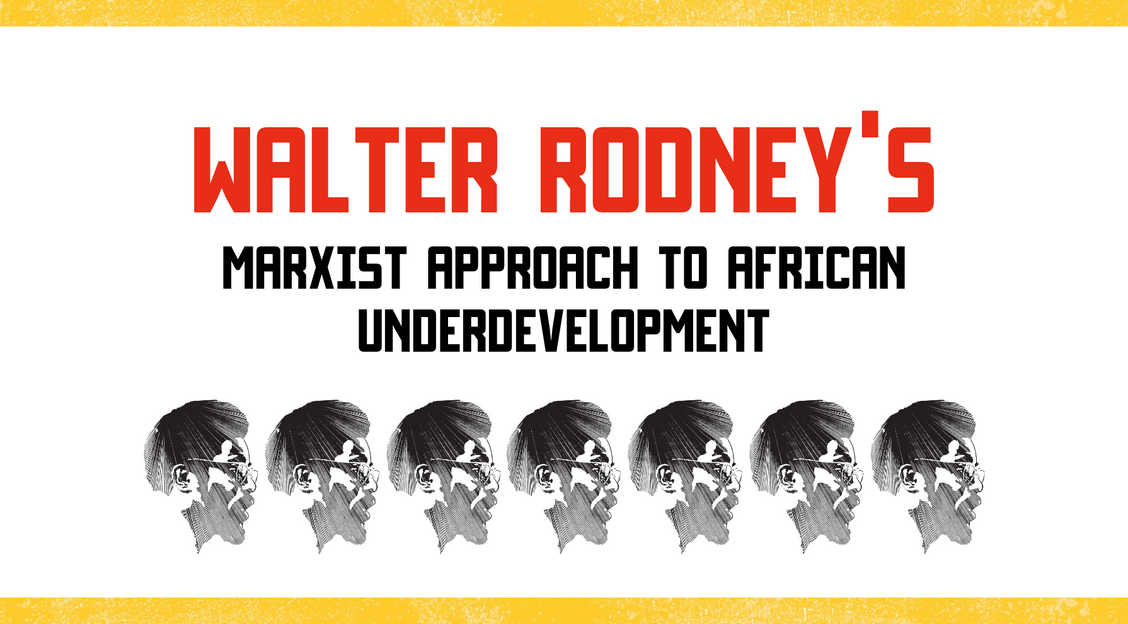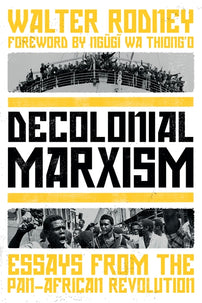Walter Rodney’s Marxist approach to African underdevelopment
An excerpt from Walter Rodney’s Decolonial Marxism, which exposes the ‘essential and unique’ role of slavery in the economic underdevelopment of a continent.

The following is excerpted from Walter Rodney's Decolonial Marxism: Essays from the Pan-African Revolution.
See all our reading from Walter Rodney here.
In evaluating the two connected concepts of slavery and underdevelopment, the principal emphasis must necessarily be on underdevelopment. Slavery – as institution, as epoch, as mode of production – acquires its significance in this formulation from an awareness of the implications of inequality and dependence in the modern world. Failure to grasp the multiple manifestations of underdevelopment as a contemporary phenomenon inevitably leads to an obscuring of the historical issues. Multinational corporations, management contracts, blockages of technology transfers and the rise of new dependent class structures in the so-called Third World provide the logical starting point for historical enquiry. No doubt it is for this reason that within the field of African studies the most effective analyses of the development process have been authored by economists, cultural anthropologists and political scientists, while historians remained locked within time capsules. It is against the background of the considerable advance in theoretical and scientific work on underdevelopment that one might resume in a new way the already long-established debate on the role of slavery.
The notion of underdevelopment has emerged out of a series of debates. There have been varying empirical observations from territory to territory and varying emphases on the constituents of underdevelopment. Yet, all approaches to underdevelopment as a historical process have discerned the presence of given tendencies towards inequality, backwardness and dependence. These tendencies are operative at most times, although they might ultimately be transcended.
It is, for instance, observable that inequality and dependence are self-reinforcing; but a decisive and obvious exception is provided by the transition from a peripheral role in colonial North America to the hegemonic position of the US within the capitalist/imperialist world. Today, the discussion continues – focusing on potentialities in Brazil, in India, and in other ‘semi-industrialized’ or ‘intermediary’ economies. In terms of modern monopoly capital, it is preferable to identify the forms of surplus realization and accumulation without prejudice to the possibility that ‘underdevelopment’ can give way to ‘dependent development’ in certain sectors of the periphery. These modifications in the approach to underdevelopment hardly apply to the period of slavery, since it predates monopoly capitalism. As a premise of this chapter, underdevelopment will be held to be an integral part of the development of capitalism on a world scale. This is not necessarily self-evident, but the arguments to this effect have been made at such length elsewhere that they have to be taken as a given in this context.
The expanded reproduction of capital and the creation of a world-system involved the realization of surplus and its extraction from all regions within the ambit of capital. This meant not merely the extension of economic activity from one continent to another but also the juxtaposition of several different social formations and modes of production, articulated in such a way as to secure the dominance of capitalist relations as well as the transfer of value to the capitalist class in the core areas. The search for greater precision in determining when capitalism became the dominant mode in Europe is beyond the present exercise and so too is an estimation of the impact of New World slavery on the emergence of capitalism in Europe. However, these questions do have relevance to the distinction between ‘commercial capital’ and ‘industrial capital’ and to that between commodity production by wage labour and commodity production by means other than wage labour. These latter issues are directly pertinent to the role of slavery in the history of underdevelopment in Africa and the Americas.
The slavery which existed in the Americas between the sixteenth and the nineteenth centuries coexisted with other modes of production in Europe, Africa and America. These were articulated to constitute a system with a capacity for further physical expansion and one which achieved inter alia the following:
1) the accumulation of capital;
2) new forms of combining and organizing capital;
3) qualitative leaps in the production of technology;
4) the development of the bourgeoisie and the proletariat; and 5) a strengthening of the state and other basic social institutions.
Any exploration of the links between slavery and underdevelopment should seek to assess the contribution of slavery to the lop-sidedness of the above points. More than that, one needs to be more confident that the contribution by slavery was essential and unique at decisive junctures.
No scholars have expressed doubt as to the enormous significance of European overseas expansion and of Atlantic trade in particular. The stumbling blocks are to be found beyond these innocuous phrases when attempting to assign weight to slavery and the slave trade.
Africa still receives short shrift in conventional texts on the subject of Atlantic trade. Yet, whenever the subject has been explored, it emerges that Africa was historically indispensable to the leading class forces in Europe. The feudal landed classes who participated in overseas expansion would have been unable to renew themselves (in the form of quasi-feudal plantations and land grants) and the nascent capitalist class needed the New World to redress the social balance in the Old. They did so by integrating the Americas into a network of financial and market relations dominated by themselves in the metropolitan centres. Africa also helped to extend the market for cheap European manufactures and to strengthen the techniques of guaranteeing capital and credit; but, of course, Africa’s key role was as supplier of labour for which there were no alternatives at the time.
- the above is an excerpt taken from Decolonial Marxism: Essays from the Pan-African Revolution by Walter Rodney.
See all our reading from Walter Rodney here.
[book-strip index="1" style="buy"]